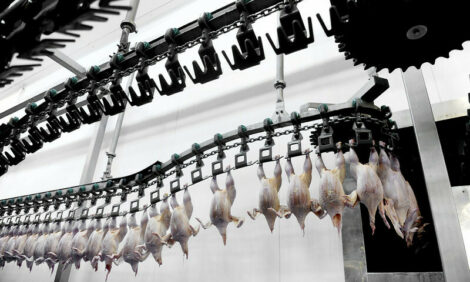



Tyson, World Resources Institute Team Up on Environmental Goals
US - As part of its deeper commitment to sustainable food production, Tyson Foods, Inc. has announced a collaboration with the World Resources Institute (WRI) to develop industry leading, science-based greenhouse gas (GHG) and outcome-based water conservation targets for its operations and the company’s supply chain.The agreement with WRI follows recent announcements about Tyson Foods’ commitment to a healthier workplace and the decision to move to no antibiotics ever in its Tyson® branded retail line of chicken, making the company the world’s leading provider of chicken raised without antibiotics.
“Sustainability is about thriving today and doing the right thing to thrive tomorrow,” said Justin Whitmore, who was recently hired as the company’s first chief sustainability officer. “We’re collaborating with WRI on aggressive and attainable goals rooted in science. These will give us the opportunity to reduce our environmental impact over time so we can benefit now, and other generations will benefit in the future.”
“WRI is committed to working with companies focused on addressing today’s most pressing issues, from climate change to water risk,” said JP Leous, senior manager of corporate relations for WRI. “Setting targets based on science and leveraging WRI’s tools, such as the Aqueduct Water Risk Atlas, enables business growth that supports thriving communities and healthy ecosystems upon which we all rely.”
Tyson Foods currently measures and reports greenhouse gas emissions from sources it controls as well as indirect emissions from the energy it buys. Environmental targets designed with WRI will eventually involve collaborating with the company’s entire supply chain, including material and ingredient suppliers, and the farmers who raise and supply Tyson with chicken, turkey, cattle and pigs.
“Tyson is focused on delivering sustainable food at scale,” Mr Whitmore said. “Only by a comprehensive, holistic approach to sustainability can we make long-lasting positive change, for our company, our consumers and customers, our team members and our planet.”
2016 Sustainability Report
The company has also announced the release of its fiscal 2016 Sustainability Report, which is focused on five key areas: Healthier Animals, Healthier Communities, Healthier Environment, Healthier Food and Healthier Workplace. “Workplace” includes nearly 114,000 team members who work for the company, and “Communities” are comprised of team members’ family, friends and neighbors in more than 100 cities and towns where it operates in the US. This is the eighth sustainability report published by the company.
Tyson’s entire 2016 Sustainability Report is available for viewing online. Highlights include:
Healthier Animals - Of the broiler chicks placed by Tyson Foods during fiscal 2016 in its entire supply chain, only 1.6 per cent were treated on farms by veterinarians with antibiotics that are also used in human medicine.
Healthier Communities - In 2016, Tyson made more than $12.5 million in cash and in-kind donations and provided more than 8.2 million pounds of food for hunger and disaster relief, and it recently gifted $340,000 to One Egg’s mission to create an economically sustainable egg farm in Haiti, providing eggs as a protein source to undernourished children.
Healthier Environment – In addition to the partnership with WRI, Tyson Foods has supported efforts by The Nature Conservancy’s Arkansas Chapter including a grant and volunteer support to help the chapter complete a significant stream bank restoration in the Oxbow section of the Kings River, monitor sediment reduction, and survey a tributary and plan its restoration. The support also includes projects on the Elk River and enrolling conservation easements in Arkansas’ Buffalo National River watershed.
Healthier Food - More than 280 of Tyson Foods’ products meet specific school nutrition regulations for fat, sodium, and calorie content, while 31 products meet USDA’s “Smart Snacks in Schools” regulations and 122 products carry the Whole Grain Stamp from the Whole Grain Council.
Healthier Workplace – Tyson continues to strive for a goal of zero worker injuries and illnesses. In its fiscal year 2016, the company reduced its overall OSHA Recordable Incident Rate by 19.4 per cent, ahead of its year-over-year goal of a 15 per cent reduction.
By investing in sustainability, Tyson expects to create a beneficial cycle of contributing to the future, while paying for itself in the present. Investments in sustainability are expected to fund themselves through reduced waste and costs.
You can view Tyson's 2016 Sustainability Report by clicking here.






